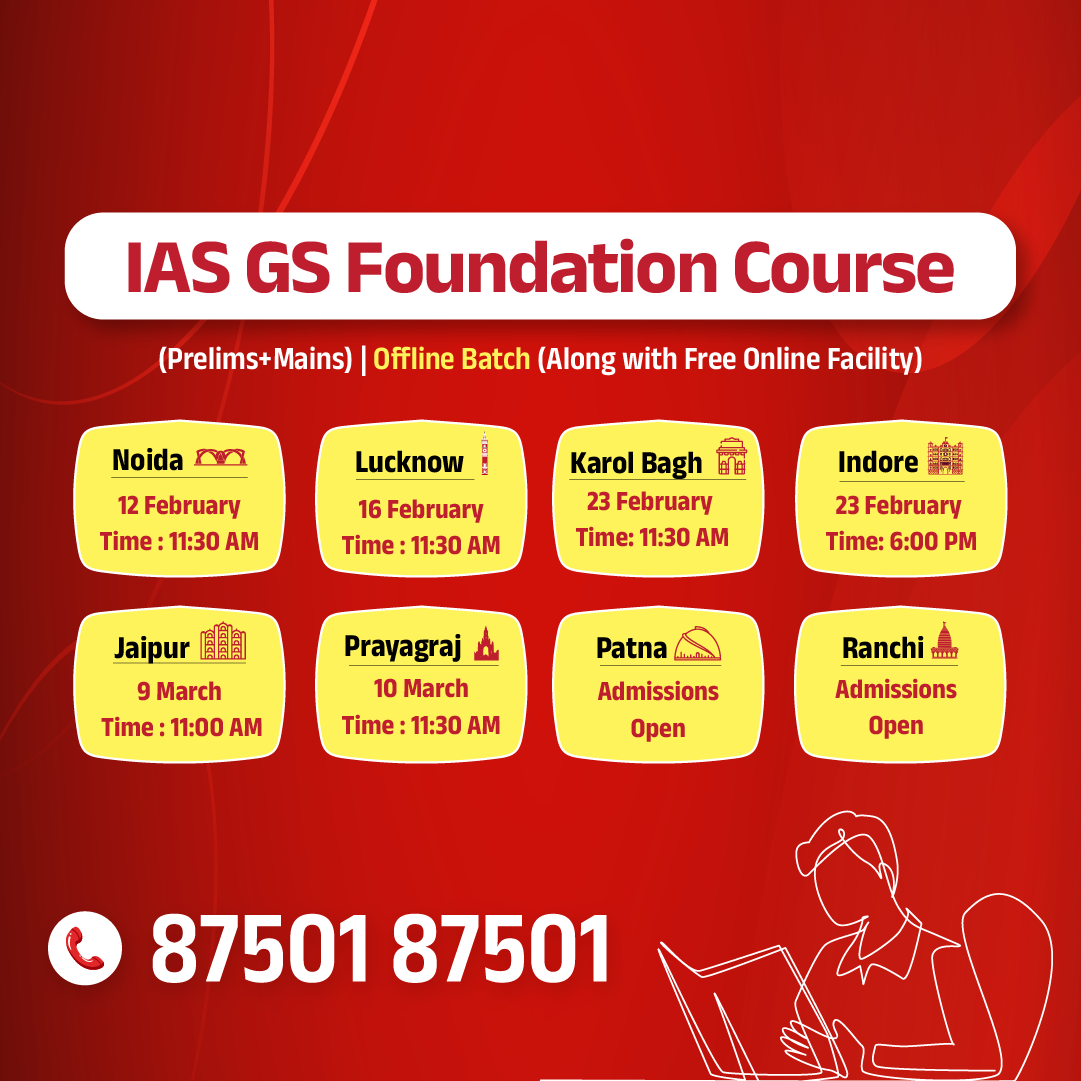Madhya Pradesh Switch to Hindi
NueGo Launches Intercity Bus Service in Madhya Pradesh
Why in News?
- Recently, India's first premium electric inter-city coach services NueGo brand announced the commencement of its operations by launching its services on the Bhopal-Indore Electric Intercity Bus Service route.
Key Points
- This bus service will provide a seamless booking experience, better ride quality and cabin experience for inter-city commuters while ensuring a safe and green ride.
- NueGo services will be available on the Bhopal-Indore route at a special inaugural offer of Rs 349 per seat.
- The company said that NueGo coaches have been equipped with innovative technology. It provides end-to-end facility for inter-city commuters, with coaches running on hourly basis between Bhopal-Indore.
- In Bhopal, the coach route will pass through ISBT, Bhopal Railway Station, Lalghati, Sehore, while in Indore it will pass through Star Square, Radisson Square, Vijay Nagar and Sarwate Bus Stand.
- Coaches of NueGo, a customer-centric brand, go through 25 rigorous safety checks including mechanical and electrical inspections. Before every trip coaches are sanitized and coach pilots are tested for breath analyzer.
- NueGo Services provides live coach tracking, drop point geo-location and monitor in-coach CCTV surveillance. This electric coach can cover 250 km on a single charge with air conditioner in traffic conditions. These coaches have completed two lakh km of road trials in the months preceding the commencement of the services.
- NueGo will provide a complete travel experience with its world class electric coach services. Soon this service will be expanded to other cities of the country.
- Satish Mandhana, Director of Greencell Mobility, said NueGo aims to promote the use of sustainable public transport with zero tailpipe emissions on inter-city routes. (Emissions standards for tailpipes specify the maximum amount of pollutants allowed in exhaust gases from an internal combustion engine.)
Haryana Switch to Hindi
Players Stood at Fourth Place will get Rs 15 lakh
Why in News?
- On August 9, 2022, Haryana Minister of State for Sports, Sandeep Singh announced a cash reward of Rs.15 lakh to the players who finished fourth in other national and international sports competitions on the lines of Olympics.
Key Points
- The Minister of State for Sports, Sandeep Singh made this announcement after the passing of the congratulatory motion moved by Leader of Opposition Bhupinder Singh Hooda. It is worth mentioning that Bhupendra Singh Hooda had proposed a congratulatory motion to the players for their outstanding performance in the Commonwealth Games in the House.
- Sports Minister Sandeep Singh said that a player of the state, who stood fourth in the Commonwealth Games, would be given a reward of Rs 15 lakh. For the first time, the government had rewarded 15 lakh rupees to the players who finished fourth in the Tokyo Olympics.
- Sports Minister said that out of the total medals won in the Commonwealth Games, the participation of players from Haryana was about 33 percent.
- Under the sports policy, the gold medalist will be encouraged by giving a prize of Rs 1.50 crore, silver medalist Rs 75 lakh and bronze medalist Rs 50 lakh.
Jharkhand Switch to Hindi
Jharkhand Tribal Festival-2022
Why in News?
- On August 9, 2022, Jharkhand Chief Minister Hemant Soren and JMM supremo & Rajya Sabha MP Shibu Soren inaugurated the two-day Jharkhand Tribal Festival-2022 at Morhabadi, Ranchi, the capital of Jharkhand.
Key Points
- Glimpses of rich tribal life philosophy have been shown in this Tribal Mahotsav-2022.
- On this occasion, the Chief Minister said that if you want to save the forests and animals, then save the tribals. The land, culture and language determine the identity of the tribals. Their existence is threatened by that new definition of development, which involves cutting down forests to set up buildings and factories.
- JMM working president said that 'Marang Gomke Jaipal Singh Munda Pravasi Scholarship Scheme' has been started to send tribal students abroad for higher education. 'Guruji Credit Card Scheme' will soon be started for students who want to take loans to pursue education. Apart from this, work is going on to set up a tribal university.
- The Chief Minister announced that from now on every year on August 9, the tribal festival would be organized and demanded the central government to declare this day as a public holiday.
- Along with this, the Chief Minister announced that on the occasion of marriage and death of anyone in the tribal family, 100 kg rice and 10 kg pulse would be given to them, so that they would no longer have to take loan for the mass meal.
Chhattisgarh Switch to Hindi
CM Releases 44 Important Books Including 'Adi Vidroh'
Why in News?
- On August 9, 2022, Chief Minister Bhupesh Baghel released 'Adi Vidroh' and 44 other books published by Tribal Research Training Institute in the World Tribal Day program organized at his residence office.
Key Points
- The Chief Minister also released the calendar of Gram Sabha Awareness Campaign towards forest rights, campaign song and video message of Community Forest Resource Right (Chargaon District Dhamtari) in the program.
- To display the valor saga of heroic tribal Jannayaks who played a leading role in various movements for the independence of the country and the revolts carried out by tribals from time to time for water-forest-land exploitation, protection from oppression and for Indian independence, Tribal Research and Training Institute has prepared a booklet on Adi Vidroh, Chhattisgarh ke Adivasi Vidroh and Swatantrata Sangram ke Adivasi JanaNayaka.
- In this book the role of the tribal leaders of the state is described from the Halba Rebellion of 1774 to the Bhumkal Rebellion of 1910 and the various movements in the pre-independence period.
- The English version of this coffeetable book has been published as The Tribal Revolts Tribal Heroes of Freedom Movement and the Tribal Rebellions of Chhattisgarh.
- Tribal Cuisine: Northern tribal areas of the state, such as- Surguja, Jashpur, Korea, Balrampur, Surajpur etc., Central tribal areas, such as- Raigarh, Korba, Bilaspur, Kabirdham, Rajnandgaon, Gariaband, Mahasamund, Dhamtari and South tribal areas, such as- Kanker, Kondagaon, Narayanpur, Bastar, Dantewada, Sukma and Bijapur districts have been recorded in the special types of dishes and their methods showing the resources available in their natural habitat and their lifestyle.
- Tribal Art of Chhattisgarh: Tribal communities residing in the districts of North Central and South region of Chhattisgarh state, useful items of their daily life, murals carved in the walls of houses, geometric figures used in specific rituals, etc. have always been the subject of attraction for the general public since time immemorial. In these, artefacts usually made on walls and on the ground, artifacts made of bamboo and rope, and tattoos or designs tattooed on the bodies of women, and their traditional knowledge have been recorded.
- Tribal Teej-Festivals of Chhattisgarh: The Kathori and Sohrai festivals of the hill Korwa tribes of the northern region of the state, Sarhul and Karma festivals of the Oraon tribes, Banagadi and Jivatia festivals of the Khairwar tribes, Chherta and Akti festivals of the Baiga tribes of the central region, Mata Rachani and Akti festivals of the Kamar tribes, Jyotis and Chaurdhoni festival of Binjhwar tribe, Uwans and Nawakhai festival of Rajgond tribe, etc., Mati Tihar and Karsad festival of Abujhmadia tribe of South region or Bastar division, Kohkang and Mati Saad festival of Muria tribe, Beej Bahadani and Teeja Chauth of Halba tribes and Amus or Hareli, Bali Parab festival of Parja tribes, and similar festivals of other tribes of the state have also been recorded.
- Anthropological Studies: An anthropological study book of 9 tribes of the state, namely- Rajgond Dhurva, Kandra, Nagvanshi, Dhangad, Saunta, Pardhi, Dhanwar and Kondh tribes was prepared, in which the origin of tribes, social organization, political life, religious life and social rites etc. is described.
- Monograph Study: A monograph study has been done on 21 points related to the lifestyle of the tribes of the state, which includes the publication related to customary law of Gond, Halba, Pahari Korwa, Kamar, Majhwar and Khadia tribes, Sarna festival of Oraon, Cultural change in Oraon tribe, Phagun Madai of Dantewada, Mavali Madai of Narayanpur, Ghotpal Madai, Bhangaram Jatra, Baiga Godna (tattooing), Bhujia tattooing, Red bungalow of Bhujia tribe, Bamboo pot making in Kamar tribe, Haat market in Kamar tribe, Haat market in Baiga tribe, Katha manufacturing method in Khairwar tribe and Handia (Popular Tribal Drink) & Mand making in Surguja division.
- Language Dialect: With the aim of preserving their specific dialects prevalent in the tribes of the state, dictionary and conversation brief in Sadri dialect, dictionary and conversation brief in Dorli dialect, dictionary and conversation brief in Gondi dialect, dictionary and conversation brief in Gondi dialect Dandami Madiya have been created.
- Primers: The work of publishing the Primers has been done for the promotion of the tribal dialects of the state and to provide alphabetical knowledge to the children of the primary level in their mother tongue. This episode includes Counting Chart in Gondi dialect, Alphabet Chart in Gondi dialect, Alphabetical Chart in Baigani dialect, Counting Chart in Baigani dialect and Barakhadi Chart in Baigani dialect etc. Apart from this, books on Rajgond, Dhurva, Kandra, Nagvanshi, Dhangad, Saunta, Pardhi, Dhanwar, Kondh have been published in other book.
Chhattisgarh Switch to Hindi
PESA Act Implemented in Chhattisgarh
Why in News?
- On August 9, 2022, Chhattisgarh Chief Minister Bhupesh Baghel, while addressing the World Tribal Day program, said that a rule has been made in the state regarding the PESA (Panchayat Extension of Schedule Area) Act, which has also been published in the Gazette on August 8.
Key Points
- Significantly, on July 7, 2022, in the cabinet meeting chaired by Chief Minister Bhupesh Baghel, the draft of the PESA law was approved. With its publication in the Gazette on August 8, 2022, it has come into force in the state.
- The Chief Minister said that the PESA Act was already in place, but due to non-formulation of its rules, the tribals were not getting its benefits, now the tribals of the state would be able to take their own decisions regarding their water, forest and land.
- With the implementation of PESA Act, the power of Gram Sabha will increase. Under the PESA Act, 50 percent of the members of the Gram Sabha will be from the tribal community. Out of this, 25 percent will be women members. They will also have the right to take decisions in the development of villages and to settle mutual disputes.
- The Chief Minister said that after the formation of his government, a public holiday was declared on World Tribal Day, tribals were given forest rights pattas, under which five lakh pattas have been given under forest rights.
- It is noteworthy that the Panchayat (Extension to Scheduled Areas) Act, 1996 or PESA was enacted by the Center to ensure self-government through Gram Sabhas for the people living in the Scheduled Areas. It legally recognizes the right of tribal communities, residents of scheduled areas to govern themselves through their own systems of self-government, and recognizes their traditional rights over natural resources.
- PESA empowers Gram Sabhas to play an important role in approving development plans and controlling all social sectors. This includes procedures and personnel implementing policies, controlling minor (non-timber) forest resources, minor water bodies and minor minerals, managing local markets, preventing land alienation, and controlling narcotics, among other things.
Chhattisgarh Switch to Hindi
Chief Minister Confers Rights of Community Forest Resources in Tiger Reserves
Why in News?
- On August 9, 2022, Chhattisgarh Chief Minister Bhupesh Baghel, taking a big initiative on the occasion of World Tribal Day, issued Community Forest Resources Charter to 10 Gram Sabhas under the Recognition of Forest Rights Act, 2006 in core and buffer areas in two big tiger reserves of the state.
Key Points
- The 10 Gram Sabhas include 5 Gram Sabhas of Achanakmar Tiger Reserve and 5 Gram Sabhas of Sitanadi Udanti Tiger Reserve.
- The 5 gram sabhas of Achanakmar Tiger Reserve, which have been empowered, are in the area of Mungeli district, out of which 4 villages are of core area and 1 is of buffer area. Of these, community forest resource rights were given to Mahamai on 1384.056 hectares, 1191.6 hectares to Babutola, 1663 hectares to Bamhani, 3240 hectares to Katami and 661.74 hectares to Manzoorha Gram Sabha.
- In Sitanadi Udanti Tiger Reserve, for the first time in the state, community forest resource rights have been jointly recognized in three gram sabhas of Sitanadi Tiger Reserve in Dhamtari district - Likhma, Baniyadih and Mainpur in 1811.53 hectares. It is noteworthy that the traditional boundaries of all three villages are the same, but due to increase in population, they were divided into three villages.
Uttarakhand Switch to Hindi
Botanists Developed Six Species of Neem
Why in News?
- On August 9, 2022, Dr. Ashok Kumar, senior botanist of Forest Research Institute told that botanists have developed six new species of neem. With this, the economic condition of the farmers will be strengthened along with producing more and more neem in all the states including Uttarakhand.
Key Points
- Dr. Ashok Kumar said that in view of the huge demand for neem and neem oil in many countries of the world including India, six new species of neem have been developed. The new species are much better than the usual ones. The new species developed will lead to higher production of nibouli and oil.
- The new species will produce 18 percent more oil than the normal neem plant. As a result, the demand for oil will be met to a large extent.
- According to the scientists of the institute, the new species will start bearing fruit three years earlier than the normal neem. Common neem plants produce fuits in six years. The amount of oil that will be produced from one kilogram of fruits coming out of the common neem plant, the same amount of oil can be made from only 300 grams of seeds from the new species of neem.
- The amount of Aazadarectin content was found to be much higher than normal in all species. In common neem seeds, where the amount of azadarectin is 1000 ppm, it has been found to be ten thousand ppm in the new species.
- According to the botanists of the institute, at present, only 35 lakh tonnes of nibouli and seven lakh tonnes of oil are being produced in the country, which is very less in line with the demand.
- Neem oil is being used extensively in the production of urea in the country, along with making antiseptic, antifungal, anti-viral and antibacterial medicines, as well as in making cosmetic items.
- Apart from India, the species of Neem is found in countries like Pakistan, Bangladesh, Nepal, Myanmar, Indonesia, Sri Lanka and Thailand and has now reached the continent of Africa, Australia, America.
- In view of the huge demand for neem seeds and oil all over the world including India, neem is being cultivated in several crore hectares in countries like China. Large-scale research is also being done about neem in countries like America, European countries as well as China.
- Neem is one such tree, which is also mentioned in the Vedas. Neem tree is mentioned in the Vedas as a cure for all diseases. It is considered a divine tree in the Vedas.
Uttarakhand Switch to Hindi
Ambulances for Animals in Uttarakhand
Why in News?
- On August 9, 2022, Uttarakhand Animal Husbandry and Milk Development Minister Saurabh Bahuguna informed that for the first time, veterinary ambulances would be started for the treatment of animals on the lines of 108 ambulances running for human in the state.
Key Points
- Minister Saurabh Bahuguna informed that the state government is going to provide treatment of sick animals at home to the cattle owners for the first time in order to create new employment opportunities in the animal husbandry business and to solve the problems of the cattle rearers.
- For this, the government has started the process to buy 60 veterinary ambulances in the first phase. By calling on the toll free number, the farmers will get ambulance service to get the sick animal treated at home.
- Agriculture and animal husbandry are the main means of livelihood of the people in the state. 8.5 lakh farmer families are involved in animal husbandry, whose livelihood comes from rearing large animals (cow and buffalo). There are about 27 lakh big animals in the state. Apart from this two lakh families are doing business of small cattle (sheep, goat, pig, horse, mule).
- Till now there is no facility of door-to-door treatment of sick animals in the state. The farmers have to take the sick animal to the veterinary hospital or animal service center for treatment, due to which the farmers have to face a lot of problems. Due to not getting timely treatment of sick animals in inaccessible areas, livestock owners have to suffer financial loss.
- It is worth noting that at present 323 veterinary hospitals are operating for the treatment of animals. Apart from this, there are 770 Animal Service Centres, 682 Artificial Insemination Centres, four Animal Breeding Farms.










.jpg)







.png)


.jpg)

 PCS Parikshan
PCS Parikshan

